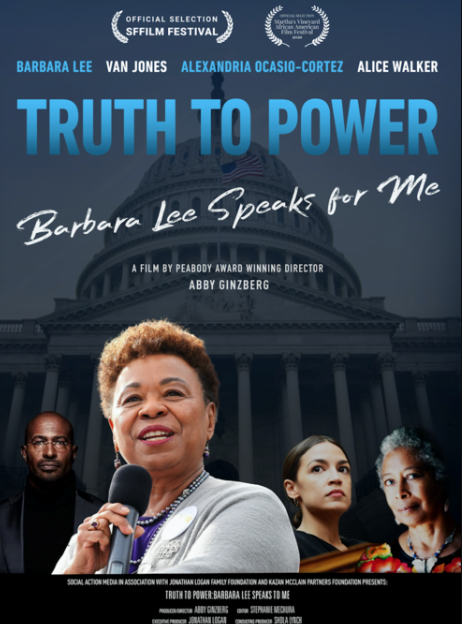NASW Sponsoring New Doc on Social Worker Rep. Barbara Lee at Film Festival
 Peabody Award-winning filmmaker Abby Ginzberg decided to do a documentary about social worker Rep. Barbara Lee (D-CA) because she lived in the Congresswoman’s Oakland-based district and wanted the world to know about her role as one of the leading progressives in Congress.
Peabody Award-winning filmmaker Abby Ginzberg decided to do a documentary about social worker Rep. Barbara Lee (D-CA) because she lived in the Congresswoman’s Oakland-based district and wanted the world to know about her role as one of the leading progressives in Congress.
“Where I sit as a constituent, I am so lucky to be represented by this fabulous Congresswoman but I don’t know how many other people in the world know anything about her,” said Ginzberg, who has done documentaries on race and social justice for more than 30 years.
Ginzberg’s documentary, Truth to Power: Barbara Lee Speaks for Me, is being shown at film festivals around the nation and is expected to be released theatrically this summer. The National Association of Social Workers, which runs this website, is sponsoring a showing of the film at the Sonoma International Film Festival in California on March 24-28 as part of its Social Work Month activities.
From Black Panthers Volunteer and Single Mother to Congress
Lee was born in Texas in 1946 but her father, a lieutenant colonel, moved the family to California. The film charts Lee’s journey from being a Black Panther volunteer and single mother on public assistance to earning her master’s degree in social work at the University of California Berkeley to being elected to the California State Assembly in 1990 and the U.S. Congress in 1996.
Lee, who is chair of the Congressional Social Work Caucus, has consistently pushed legislation that supports human rights, peace and economic and racial justice while in Congress. The documentary also covered one of her most controversial actions — Lee was the lone member of Congress to vote against giving President George W. Bush unlimited military authority after the September 11, 2001 terrorist attacks.
Ginzberg explained that Lee, a social worker, recognized that the nation was grieving after more than 2,000 citizens died in the attacks and so it was unwise to take quick military actions. Her prudence, although unpopular at the time, has proven to be wise. The United States has remained engaged in 41 actions that have claimed thousands of American lives since 9/11.
“That was an amazing act of commitment and courage when she, in spite of the fact that so many people told her that her political career would be on the line, said no,” Ginzberg said.
Social Work Influences “Seeded” Throughout Film
References to Lee’s career as a social worker are seeded throughout the film but Ginzberg said she did not delve too much into how social work influences Lee’s work in Congress. She wishes she had included more of that in the documentary. She said many lawmakers are lawyers and tend to treat lawmaking as a court battle that they must win. Lee, a social worker, brings a whole different skill set.

Abby Ginzberg
“I think it’s Barbara’s training as a social worker that makes her particularly effective as a listener,” Ginzberg explained. It also helped her to forge relationships with conservative lawmakers such as the late Rep. Walter Jones (R-NC), who was later concerned about casualties and raising troop levels, Ginzberg said.
Ginzberg worked on the documentary for close to two years starting in 2016. One of the hardest tasks was building trust with Lee, who was wary of being followed by a camera. But Ginzberg was patient and Lee came around. “Today, Barbara and I can laugh about how difficult she was at the beginning and we are both happy with the final product–so the filmmaking and the film had a happy ending,” she said
Ginzberg said Lee was one of few progressive lawmakers and was more isolated but over time, and especially since she started working on the film, more progressive Black and women lawmakers have been elected to Congress. In fact, Lee has helped support some of their campaigns, including that of Rep. Lucy McBath (D-GA).
Learn more about Truth to Power: Barbara Lee Speaks for Me and how to watch it on its website. To see other festivals where the film will be screening go to truthtopowermovie.com. Rep. Lee also supports a $15 minimum wage, which Ginzberg said is related to her next film project Waging Change, which is about restaurant workers and the fact they are paid a federal “tipped minimum wage” of only $2.13 an hour. Here is how you can watch that film.
| Leave A Comment
Advertisement
Leave a Comment
You must be logged in to post a comment.


